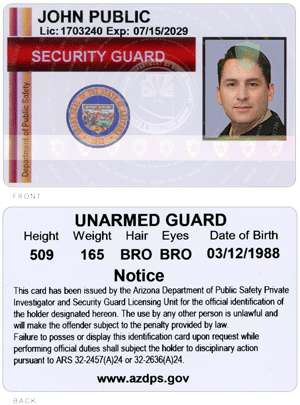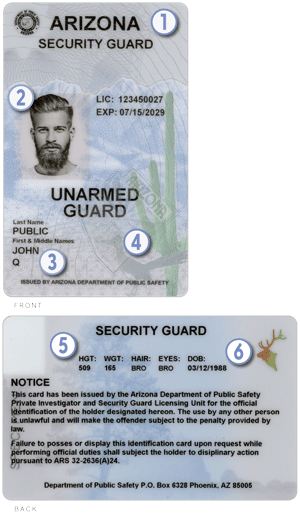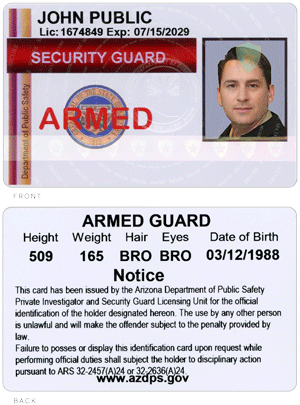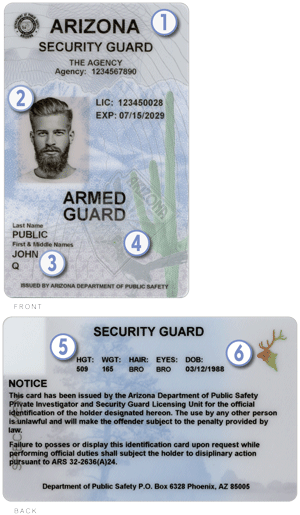
Arizona 8-hours Online Arizona DPS Unarmed Skills Training Class for Security Guards
SALE! SALE! SALE!
Our unarmed guard card courses (initial and renewal) are on sale for $29.99!
8-hours Pre-assignment Training
The entire class is online! All of the lessons can be taken at any time of the day or night. The student sets the time to learn without the hassle of restricted classroom hours or limited space. Complete each lesson at your pace and when it is convenient for you. Each lesson is on-demand.
The complete training course is broken into 9 lessons and must be completed before the guard begins work.
To make the training material easier to use, each lesson is divided into modules of approximately 1-hour blocks. Each module must be completed in order and with a score of 100% on the Knowledge Checks. Students may return to a previously completed module to review any and all material.
In order to pass the entire course, the student must complete the final examination with a score of 100%.
This training program complies with all requirements as mandated by the Arizona Department of Public Safety (DPS).
- The student has 60-days (2-months) to complete the training.
After 60-days, the course expires. No refunds apply.
Online Class Completion
Certificates and forms:
- Certificate of Completion.
Certificate of Completion and application forms are immediately available after successful completion of the course. Available on the Transcipts page. - Unarmed Security Guard Training Verification Form.
- Initial application.
- Application instructions.
Requirements for Becoming a Security Guard
Click here to review the minimum requirements to become an Arizona Security Guard.
Arizona Revised Statute, Title 32, Chapter 26, Article 4, §32-2632. Duty of licensee to provide training of security guards; records; firearms training. (A)
Back to topAn agency licensee shall provide eight hours of preassignment training of all persons employed as security guards before the employee acts in the capacity of a security guard. The required training curriculum shall be established by the department.
Arizona Administrative Code, Title 13, Article 6, §R13-6-601. Security Guard Pre-assignment Training.(A)
Back to topThe qualifying party of a security guard agency shall ensure that a person employed as a security guard by the agency completes eight hours of pre-assignment training before applying for and being granted a security guard registration certificate.
Video: The Security Guard Card Online course.
About the STC Security Guard Card Online course.
Old and New Guard Cards
The Arizona Department of Public Safety (AZDPS) updated their regulatory credentials with a new design that features iconic images representing Arizona. The front of the card will have the saguaro cactus and roadrunner, and the back of the card will showcase the Ponderosa pines and an elk head, highlighting the diversity of the state's terrain and wildlife. This new design aims to provide a visually appealing credential and foster a sense of pride and connection among Arizona residents.
Unarmed Guard Cards
Old

New

Armed Guard Cards
Old

New

Lesson 1, Orientation
Back to topObjectives:
- Understand the requirements to become a security guard in the State of Arizona.
- Be able to successfully complete the application process.
- Understand the essentials of other courses and certification available to security guards.
- Understand the guard registration renewal requirements and timelines.
Lesson 2, Criminal law and laws of arrest
Back to topObjectives:
- Understand the law of arrest as it pertains to private security in the Arizona.
- Understand the fundamentals of criminal law.
- Know the responsibilities of a private security guard.
- Understand the limits of search and seizure as it applies to private security in Arizona.
Lesson 3, Uniform and grooming
Back to topObjectives:
- Understand the law and codes surrounding uniforms and vehicle markings.
- Understand the law and codes surrounding badges and insignias.
- Present a professional appearance.
- Understand the necessity for clean and hygienic clothing and gear.
- Apply the fundamentals of a command presence.
- Understand the sources of power.
Lesson 4, Communications
Back to topObjectives:
- Write an effective report.
- Take descriptive and useful field notes.
- Properly employ all senses in observation.
- Conduct an appropriate interview.
- Summarize four specific reasons why consumers may become violent.
- Identify personal reactions to confrontation.
- Describe personal Risk Factors related to violent behavior.
- Explain the Stress Model.
- Discuss the Theoretical Models of Assault.
- Define how the working environment can affect behavior.
- Configure a safe working environment.
Lesson 5, Use of force
Back to topObjectives:
- Understand the elements of assault.
- Explain the appropriate use of force.
- Understand the levels of force.
- Know how to deescalate a potential conflict.
Lesson 6, General security guard procedures
Back to topObjectives:
- Properly employ all senses in observation.
- Conduct an efficient and productive patrol.
- Distinguish the importance of effective internal and external communication.
- Summarize the importance of reading and understanding Post Orders.
- Describe the need for confidentiality of protocols and contact information.
- Describe the common types of communication systems.
- Effectively use common communication systems.
Lesson 7, Crime scene preservation and first response
Back to topObjectives:
- Conduct a thorough area search.
- Identify common forms of evidence.
- Explain proper care and handling of evidence.
- Summarize the correct procedure to secure a scene.
- Understand common legal issues regarding evidence.
- Collect appropriate information from witnesses.
- Identify types of evidence.
Lesson 8, Ethics
Back to topObjectives:
- Recognize and avoid gender and racial harassment.
- Recognize and avoid discrimination.
- Recognize the signs of substance abuse.
- Understand and develop respect of others.
- Understand diversity.
- Understand the code of ethics and proper code of conduct.
- Understand the basics of driving courtesy and policy.
Lesson 9, Emergency response procedures
Back to topObjectives:
- Distinguish the importance of effective internal and external communication.
- Summarize the importance of reading and understanding Post Orders.
- Describe the need for confidentiality of protocols and contact information.
- Demonstrate the basic information to collect in an emergency.
- Make a direct and efficient call for assistance.
- Describe the common types of communication systems.
- Effectively use common communication systems.
Information provided on this site is educational. It is not legal advice. Training does not guarantee licensing or employment.


